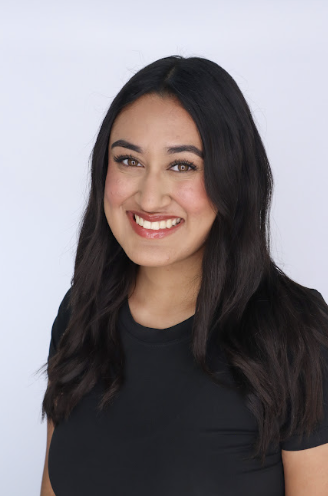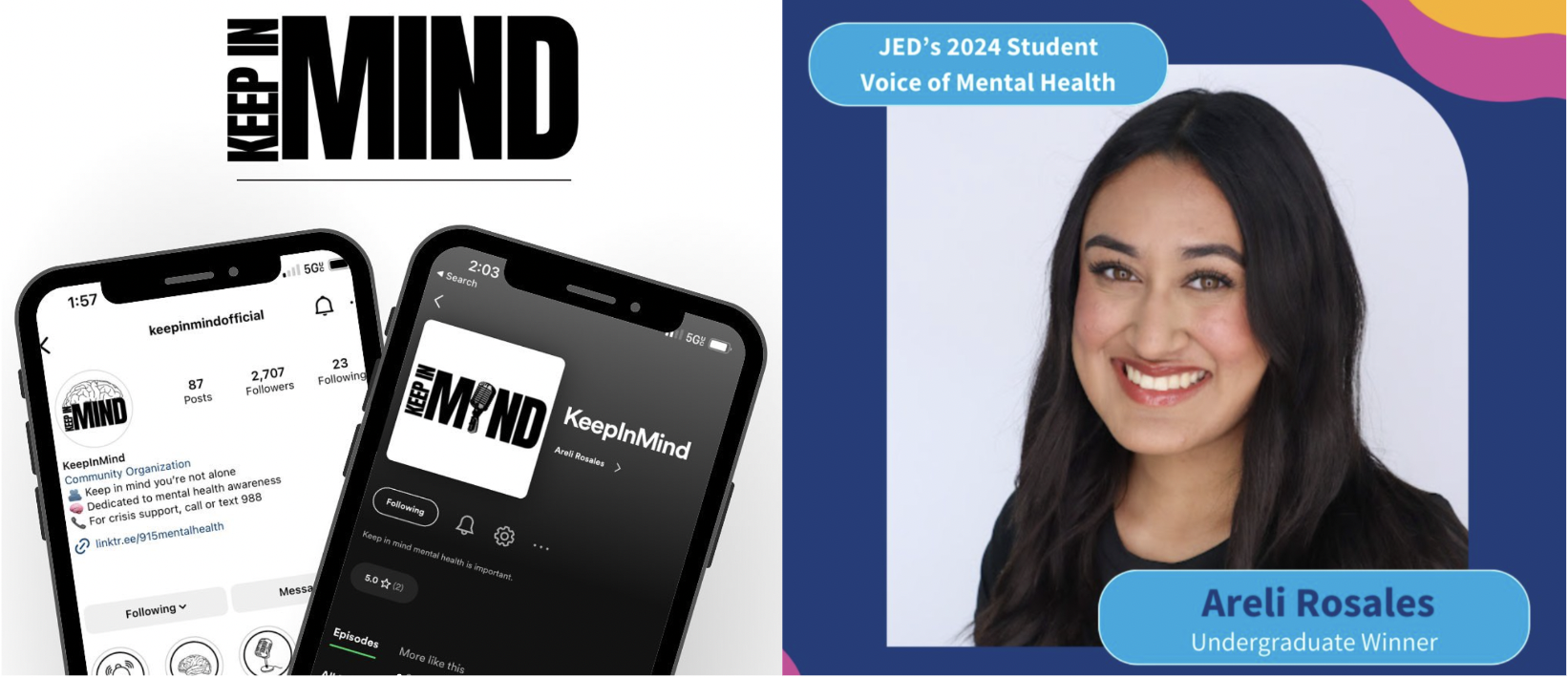What This Winner of the Nation’s Top Mental Health Award Wants Girls to “Keep in Mind”
Mental Health Awareness month begins this week, and young change-makers are more than ready. With riveting stories to tell and award-winning resources to share, students like 20-year-old Areli Rosales are making a major difference this May…exactly when it matters most.
Areli is one of two students recently chosen to receive the 2024 Student Voice of Mental Health Award from The Jed Foundation (JED). JED, a leading nonprofit that protects the emotional health of today’s teens and young adults, honors one high school student and one college student each year creating innovative communities of care in their schools and communities.
When I first heard about Areli, a first-generation college sophomore at the University of Texas at San Antonio, and the organization she built called KeepInMind, I not only wanted to know more – I wanted every young person to know about her too. Particularly because according to Être’s latest research, between the ages of 13 and 18 the percentage of girls who say they feel anxious rises by 88% and the percentage who say they feel stressed rises by 241%.
The good news?
The research showed that in that same age group, girls with mentors feel happier, more confident, less anxious and less stressed. Mentors like Areli.
Raised in a Hispanic household in El Paso, Texas by a single mother while her father was imprisoned, Areli told JED that mental health was not frequently discussed. Surviving sexual assault and a suicide attempt, Areli launched her nonprofit in 2021 and has since expanded its reach across her campus through support groups and weekly workshops. Below is an edited version of my interview with Areli Rosales. Keep in mind, she’s all kinds of amazing.
Ê: First of all, congratulations on your award! We’re so impressed by your work – talk to me a little about KeepInMind. What led you to start it?
AR: Thanks! So, I launched KeepInMind after receiving professional help for my lived experience with mental health conditions. As a young child I experienced traumas that impacted me and led me to experience symptoms of depression, anxiety and PTSD. But due to cultural stigma and a lack of knowledge, I struggled with these symptoms without being able to identify them for years.
When COVID-19 happened I found myself confronting these burdens and struggles more directly, and they felt unbearably heavy. That journey led me to survive suicide attempts and look for help.
“Finally seeking help and discovering the meaning of mental health, I learned some effective ways to cope with this darkness.”
And the experience enabled me to recognize similar struggles in my peers. Ultimately, I founded KeepInMind so I could extend my knowledge and healing to my larger community.
Ê: It seems like all of this happened pretty quickly! It wasn’t so long ago that we went through the pandemic, and now you’ve built something incredible to help people while you’re still healing yourself. Is that hard to do simultaneously?
AR: It is – it was all as I was learning my own coping skills and mechanisms to deal with these stressors. But I found it very healing and empowering to be able to help others through the same thing I was feeling. It propelled me to continue moving forward because I knew that other people were experiencing similar struggles. We were all in a community supporting each other in our journey and helping them helped me.
Ê: That’s truly moving. And all while you’re doing so many other things! You’re a podcast host, an author, a film producer…it feels like you are inherently a storyteller, unpacking and telling difficult stories. Why is it so important to share these stories?
AR: As a storyteller I consistently embrace vulnerability. At first it can be scary and uncomfortable, especially when it comes to stereotypes around mental health and the fear of being labeled as crazy or dramatic…or being an attention seeker. But, it is so necessary.
“Being vulnerable is not something to be ashamed of because it is a part of being human being and learning to live this life.”
Sharing the stories of other people along with sharing my own has allowed me to create a sense of safety and comfort, because it’s reassuring to open up and know that you’re not the only one feeling vulnerable. Knowing you’re not alone in your feelings gives you the power to continue, because you feel supported and seen and heard.
Ê: How did you first connect with JED? Is that where you went for initial resources?
AR: Yes, The Jed Foundation is a leading nonprofit that protects emotional health and prevents suicide in teens and young adults. In doing my own research and trying to find resources for me and my peers, The Jed Foundation came up and it’s been amazing.
Ê: In addition to resources, let’s talk for a minute about role models. Did you have a specific mentor on this journey?
AR: My mentors were really my therapists, and they were super helpful in guiding me through tough experiences and teaching me the coping skills that I needed to have positive mental health. They played a big role in my journey learning emotional resilience, which can be overwhelming.
Ê: It absolutely can. What would you say to your younger self? This has all happened in a narrow time period, but is there a piece of advice you would give your pre-COVID self now if you could?
AR: The advice I would give to my younger self is that it is okay to ask for help. Growing up in the Hispanic community, I constantly heard that you have to be strong. I interpreted that as having to hide my struggles and conceal the fact that I was, actually, not okay. That attitude only prolonged my pain over the years.
“If I could go back, I would tell a younger me that you are not weak. You do not have to face it alone, and there are professionals ready to help you reclaim the strength that is already in you.”
Ê: I want that to be a screensaver for every girl! Just put that on every phone or laptop - exactly like that. If parents, students, or teachers want to get involved with KeepInMind, how can they do that? How do they find you?
AR: The best way to engage with KeepInMind is to follow us on Instagram. In our upcoming workshops, community projects and support groups, we have space for you to not only use your voice to raise mental health awareness, but also to gain mental health education.
Ê: Any last point you’d like to make before we end our interview?
AR: Just this: What I thought was the end of my story turned out to be just the beginning. It is possible to overcome your mental health challenges. There is a community of people ready to support you and love you. Just ask.
Just ask.
Reach out.
If Areli’s words and nonprofit tell us anything, it’s that voicing your story matters. Sharing your experiences leads to uncovering help in the form of resources and role models, and The JED Foundation is a great place to start.
We’re so proud to have JED Senior Clinical Advisor Dr. Katie Hurley on Être's Board and an entire page on the Être website called Be Balanced powered by The JED Foundation, giving girls free and instant access to the same resources that helped Areli. How can you and the girls in your world find them?
Just ask.
May is Mental Health Awareness Month. May increased awareness and bravely told stories bolster your mental wellness now and throughout the year.
Looking forward,
Illana
ÊXTRAS: Three more resources from JED you won’t want to miss during Mental Health Awareness Month: How to take care of your own mental health, how to check in on a friend’s mental health, and how to create your own mental health plan.






